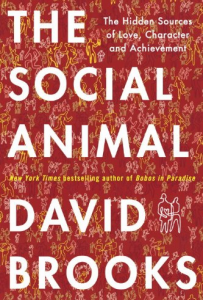I have a complicated relationship with David Brooks. I’ve long thought he has a particular insight into a particular class of people, and that he’s completely untethered from the reality of most human beings. When my good friend Roy Edroso would write about how out to lunch Brooks’ column in the Times can be, I couldn’t agree with him more.
And yet, there is something disarmingly insightful that Brooks has to share from time to time, detached as he is. He can be bull’s eye on the money within his little world. For years I thought his belief that there’s nothing, nothing more important for parents who are Bobos in Paradise – not their kids’ health, not seeing their kids graduate from Harvard, or even seeing their child cure cancer – than having their offspring’s wedding featured in the Times Style Section. (I found this doubly true after I actually went to a wedding featured in the Times Style Section.)
It was Bobos (the tale of the Clinton-era Bohemian Bourgeois) – introduced to me by my brother in all things political, Jason Pattan – that started my love-hate relationship with Brooks. Jason told me he’d found a writer with whom he mostly disagreed with…but he’d write things in a way that he could almost convince him, until he thought about it longer. I concur wholeheartedly. Brooks can be full of shit. But since he’s so less batshit crazy than other conservatives, I give him the time of day. Plus, he sometimes makes me laugh. Sometimes the laughter is at how out of touch he is with reality, but I was always listen to what he has to say, even if I throw it out eventually.
So when I heard he was writing a book called The Social Animal, I was both appalled and amused. Even from his intro, it’s obvious he’s aware of his own shortcomings to write such a book. And yet, he plows on obliviously.
Brooks knows that society’s current view of success is overly dependent on academic, financial and materialistic markers, and relies little upon the things that “really” matter: connection, love, socializing. And yet, he seems to have little awareness that, unfeeling, detached, rich, privileged and white as he is, he is in little position to write the book that re-orients our thinking along less materialistic lines.
It is very clear so far in the first few pages that Brooks thinks being successful requires being tall, white, educated, heterosexual, and married. There’s an air of homophobia in how defensive he is about acknowledging male good looks. A very clean, socially acceptable form of racism and classicism is present, but the heteronormative aspect stands out for me the most (unless, you think, in how over the top Brooks’ is about marriage, he may be invoking that right for everyone).
And yet, despite my own prejudices, I am trying to read this with something of an open mind. Harold and Ericka seem pretty WASP-y to me so far. But I will grant Brooks this: he’s a good enough writer I usually have something to learn from him, even if it’s by foil. Clearly, this is not poetry, and perhaps I’d be better off reading another novel or a book of poetry to gain further insight into the human condition. But for some reason I picked this up off the review stack at the Voice and will try to see why it surged so fast to the top of the bestseller list. Brooks may fail at the mission he set forth, but I’m kind of curious to see how he does or if, perhaps he succeeds.

